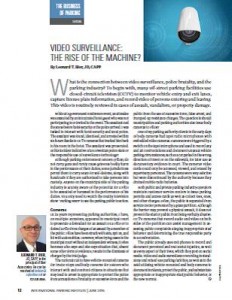What is the connection between video surveillance, police brutality, and the parking industry? To begin with, many off-street parking facilities use closed-circuit television (CCTV) to monitor vehicle entry and exit lanes, capture license plate information, and record video of persons entering and leaving. This video is routinely reviewed in cases of assault, vandalism, or property damage.
While at a government conference event, an attendee was assaulted by an intoxicated hotel guest who was not participating in or invited to the event. The assailant fled the scene before hotel security or the police arrived. I was tasked to interact with hotel security and local police. The assailant was found, identified, and arrested within six hours thanks to CCTV cameras that tracked him back to his room in the hotel. The assailant was prosecuted. Is this incident indicative of an Orwellian police state or the responsible use of surveillance technology?
Although parking enforcement officers (PEOs) do not carry guns and rarely cause grievous bodily harm in the performance of their duties, some jurisdictions permit them to carry Mace for self-defense, along with handcuffs if they are authorized to take persons into custody. Anyone on the municipal side of the parking industry is acutely aware of the potential for a PEO to be assaulted or harassed in the performance of his duties. You only need to watch the reality television show “Parking Wars” to see the parking public in action.
Cameras
In 36 years representing parking authorities, I have, on multiple occasions, appeared in municipal court to prosecute a defendant for an assault on a PEO or to defend a PEO from charges of an assault by a member of the public. PEOs have been struck with fists, spit on, and hit with automobiles. However, when trying cases in the municipal court without an independent witness, it often becomes a he-says-and-she-says situation that, absent some other form of evidence, results in the dismissal of charges by the trial judge.
The national call to have vehicle-mounted cameras for traffic stops and body cameras for officers who interact with and confront citizens in situations that may lead to arrest is appropriate to protect the police from accusations of brutality or excessive force and the public from the use of excessive force, false arrest, and trumped-up resistance charges. The question is should municipalities and parking authorities also issue body cameras to PEOs?
One of my parking authority clients in the early days of body cameras had lapel radio microphones with embedded video cameras. Cameras were triggered by a switch on the lapel microphone and used to record any and all confrontations and document unusual vehicle parking circumstances, such as a car parked in the wrong direction of travel or on the sidewalk, for later use as documentary evidence in court. The cameras’ video cards could only be accessed, viewed, and erased by supervisory personnel. The cameras were very effective but were discontinued by the authority because they drained mobile radio batteries.
Both public and private parking industry operators maintain customer service centers to issue parking permits and access cards as well as collect fees, fines, and other charges. Often, the public is separated from service center personnel by a glass partition. Although the barrier may prevent a physical assault, it does not prevent the staff or public from being verbally abusive. CCTV cameras that record audio and video on both sides of the partition can assist management in assessing public complaints alleging inappropriate staff behavior and determining the true responsible party in a confrontation.
The public already uses cell phones to record and document perceived and real social injustice, as well as every aspect of their lives, which they post on social media. Video and audio surveillance recording in standalone and mixed-use parking facilities, as well as in the field utilizing vehicle-mounted and body cameras to document incidents, protect the public, and substantiate appropriate or inappropriate staff/public behavior, is the new normal.
Leonard T. Bier, JD, CAPP, is the principal of Bier Associates. He can be reached at lenbier@optonline.net or 732.828.8864.
TPP-2015-06-Video Surveillance The Rise of the Machine

